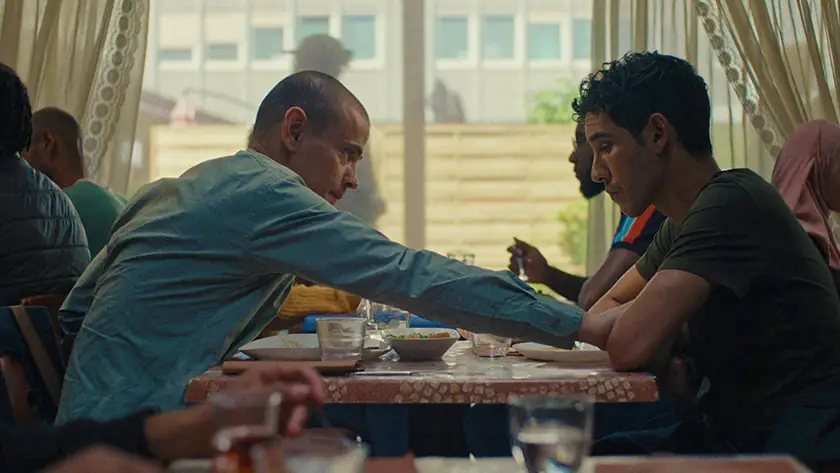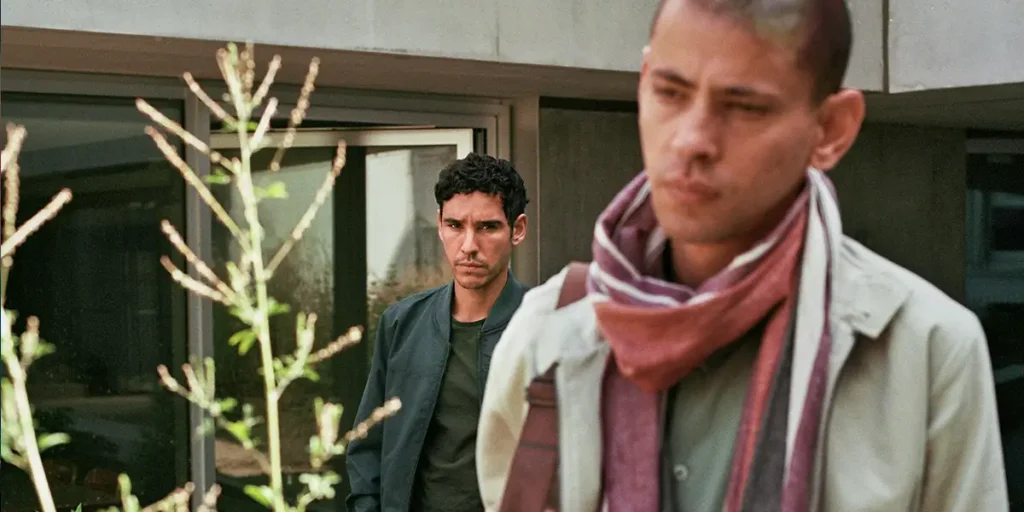Ghost Trail is a mature, thoughtful look at the trauma of a Syrian refugee, even if its understated nature goes too far and dulls its impact.
Director: Jonathan Millet
Genre: Drama, Spy Thriller
Run Time: 106′
Original Title: Les Fantômes
U.S. Release: May 30, 2025 (limited theatrical); July 8, 2025 (digital)
U.K. Release: September 19, 2025
Where to Watch: On digital platforms (USA) / In cinemas in the U.K.
Ghost Trail is a spy thriller directed by Jonathan Millet, who also co-wrote it with Florence Rochat. The film starts in 2014 and follows Hamid (Adam Bessa, of Extraction 2), a Syrian refugee who endured detainment and torture at the hands of the Assad regime. Now, with that regime fallen, he’s a literature professor and part of a secret organization with the goal of hunting down its enforcers. On the top of his list is Harfaz, the very guard who tortured him, whom he suspects is a man he finds at his university (Tawfeek Barhom, of The First Omen). His mission also requires collaboration with his partner Nina (Julia Franz Richter, of Undine), whose approach to the situation conflicts with Hamid’s gut instincts.
The real-world themes in this movie are clearly very sensitive and complicated – not at all like today’s Middle East politics – and Jonathan Millet seems perfectly aware of that, as his approach to Ghost Trail is the polar opposite of sensationalized. There’s practically no on-screen violence, no disturbing imagery, and only a tiny window into the actual experience of the abuse Syrians like Hamid went through around this time. Instead, we’re almost exclusively treated to the mental and emotional scarring that comes afterward, and how it influences – and potentially compromises – Hamid’s investigation of a man he’s convinced is the stranger he stalks. That’s a much more interesting approach and probably more likely to connect with audiences who have don’t have any relevant trauma, without alienating those who do.
Hamid’s goals of taking down such terrible people are admirable and understandable, but it’s also easy to see that they’re doing harm to his own recovering life. He commits himself to places that don’t offer the best life available to him, he has no visible personal connections, and he’s torn as to whether he should instead help his refugee mother in Lebanon (Shafiqa El Till). His investigation is reenforcing and reactivating his trauma and inability to go forward in life, especially as he listens to testimonies of other torture victims. And as his hunches leave open the possibility of him not even having the right person, you may start to ask yourself if what he’s doing is even worth it for him.

By far the most interesting scene in Ghost Trail is a long-awaited conversation between Hamid and the suspected Harfaz. As the latter shares his stories, thoughts on the present Syria, and belief in moving on from the past, the notion of the right path gets murkier than ever. Hamid could just walk away from everything, but would that be a disservice to other victims? Is he obligated to help them? Or, given the other man’s likely identity, would doing so play right into the hands of people who don’t want anyone to dig deeper in the past? That duality between activism and self-preservation is at the core of the film, and they do a lot to keep you reasonably invested in a movie that’s quiet by design… or, some might say, uneventful.
Which leads me to why I respect Ghost Trail a lot more than I actually like it. In exploring Hamid’s emotional state, the film starts to feel procedural somewhat early on. A lot of it consists of Hamid being pained by memories of his experiences, being pushed by his mother to live more happily, pursuing Harfaz, trying to convince his team he has the right person, going through evidence, being pained by the memories they trigger… and that all keeps repeating itself many times, with the occasional bit of an overwrought score on top.
Ghost Trail wants to keep us at a tasteful distance from the horrific abuse it touches upon while getting us intimate with the effects of it. But it may not have known how to achieve that without padding out its length. It’s 1 hour and 45 minutes long, but I think trimming it down further to a tight 90 minutes could have benefited the overall picture greatly.
The other big issue is that – and it bums me out to say this – I didn’t connect with Adam Bessa’s acting at all here. I get that it’s not supposed to be a showy performance, given the inward trauma he’s supposed to convey. But it’s so subdued and withdrawn that it comes across like underacting to me, with his nearly blank expression and melancholic voice almost never changing. Julia Franz Richter has a similar issue, and the fact that almost all dialogue is delivered in such stoic near-whispers doesn’t help either. The problem isn’t nearly as detrimental as Limbo, a film I levied similar complaints at, but it took me out of the movie more than it pulled me in.
Ghost Trail has a unique, important, yet uncommonly gentle voice that wants to leave the viewer with a lot of loaded questions concerning one of modern history’s darkest corners. It succeeds in that goal with a solidly made, respectably tactful, and occasionally well written movie, but I’d be lying if I said I was fully engaged the entire way through. It’s a decent movie with a great heart, but to twist a famous quote from Roger Ebert, I’m much more invested in what it’s about than how it’s about it.
Ghost Trail: Movie Plot & Recap
Synopsis:
A Syrian refugee pursues a man he suspects to be his former abuser.
Pros:
- Tactful and avoids sensationalizing its subject matter.
- Some thoughtful conversations.
Cons:
- Repetitive structure.
- Underwhelming performances.
Ghost Trail is now available to watch on digital and on demand in the U.S. and more countries. The film will be released in U.K. cinemas by New Wave Films on 19 September, 2025.

